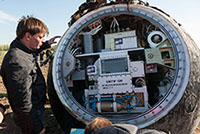|
2016 February
SSC RF Institute of bio-medical problems of RAS, being the leading institution of the project, starts to create the scientific program of investigations and invites interested institutions to take part in animal investigations.
2015 July
Roscosmos signed the contract with SRC Progress for manufacturing space apparatus for conduction biomedical experiments BION-M#2.
2015 February
Researchers from IBMP and University of Florida managed to find an answer for the question why cosmonauts’ long exposure to weightlessness sometimes causes vision disorders.
2014 November
On November 18 2014, the Russian Academy of Sciences has begun work XV Conference on Space Biology and Aerospace Medicine with international participation.
2014 September
On September 26 2014 in ITAR-TASS News Agency a conference was held. Preliminary results of biological experiments, carried out on board of Foton-M No.4 SC, were announced.
2014 September
The ground control experiment in scales of the Foton-M No.4 research SC program was successfully finished.
2014 September
On September, 1 at 13:18 Moscow time Foton-M No.4 SC landed in designated position of Orenburg district.
2014 July
On July, 19 at 00:50 Moscow time carrier rocket Soyuz-2.1a with Foton-M No.4 SC was launched from cosmodrome Baikonur.
2014 July
In the night of July, 16 upload of scientific equipment and biological objects in the Foton-M No.4 SC was successfully finished.
2014 May
Information Letter.
Launch of Foton-M No.4 research spacecraft is planned on summer 2014 from cosmodrome Baikonur, Kazakhstan.
2014 February
Information Letter.
XV Conference on Space Biology and Aerospace Medicine with international participation "BION-M1 PROJECT: Results and Forward Plans".
18-20 of November 2014, The Conference will be held on the Presidium of the Russian Academy of Sciences, Moscow, Russia.
2013 September
Мemorandum on the results of studies conducted in mice after a 30-day space mission BION-M № 1.
2013 Мay
May 22 IBMP RAS hosted a conference following the flight of spacecraft "Bion-M» №1.
2013 Мay
OMEGAHAB Post-Landing Report.
2013 Мay
On 19th of May at 07.12 the Landing Module BION-M1 successfully touched down at Orenburg region.
2013 апрель
April 19, 14 hours, 00 minutes (msk) from Launch Complex 31 of Baikonur Cosmodrome conducted a successful launch of a space rocket "Soyuz-2.1a" ...
2013 February
On February 18, accompanied by the specialists of Samara "TsSKB "Progress", SV "Bion-M" and carrier-rocket "Soyuz-2.1b" were delivered to launch area Baikonur ...
2012 June
"Bion-M1" is scheduled to launch April 15 - 25, 2013.
2011 February
Bioengineering tests of animal habitats (MLZh-01-01) were performed from February 8, 2011 through March 14, 2011 at the habitat’s manufacturer - Biophyspribor (St.-Petersburg, Russia). The habitats will house mice and geckos in the space environment (microgravity) ...
2010 November
Bioengineering tests of the Kontur-BM unit were performed from November 5, 2010 through December 3, 2010 at the Institute of Biomedical Problems, Russian Academy of Sciences ...
|

 Progress in space exploration and use was achieved through, among other things, space biology and physiology research onboard manned and unmanned space vehicles. The investigations helped elucidate the fundamental mechanisms underlying the structure and function of living systems exposed to altered gravity and other spaceflight effects. The results have led to advancements in space biology, physiology and biotechnology and have been widely applied in the implementation of manned space missions, including their medical support.
Progress in space exploration and use was achieved through, among other things, space biology and physiology research onboard manned and unmanned space vehicles. The investigations helped elucidate the fundamental mechanisms underlying the structure and function of living systems exposed to altered gravity and other spaceflight effects. The results have led to advancements in space biology, physiology and biotechnology and have been widely applied in the implementation of manned space missions, including their medical support.